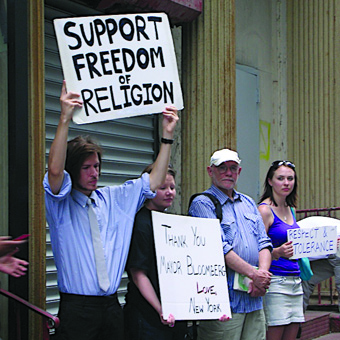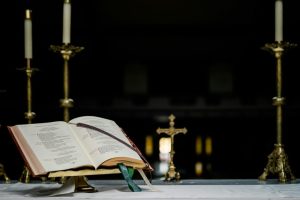Only our better angels can guide us to interreligious understanding.
American politics always seems to turn on the next "threat" to our security, especially in an election year. Warnings about hordes of brown-skinned Spanish-speaking "illegals" had kept the nation on high alert through most of 2010, but as elections drew near and pundits and politicians saw demonizing immigrants as a loser among Hispanic voters, the search was on for a new bogeyman.
Enter the Rev. Terry Jones, a Gainesville, Florida pastor of 50 souls, who took the national stage by threatening to burn a stack of Qur'ans on the anniversary of 9/11. As the date neared, God (speaking through a local Florida imam) convinced Jones his plan was a really bad idea, to general relief.
Fueling the Jones affair was the case of Park51, a Muslim community center in Lower Manhattan two blocks from the site of the 9/11 attacks. Dubbed the "Ground Zero Mosque" by some master of incendiary propaganda, this Muslim equivalent of a YMCA sparked outrage among some who found it disrespectful that a Muslim prayer room should be so close to the site of an attack by Muslim extremists (whose victims included Muslims). Though Imam Feisal Abdul Rauf proposed Park51 as a place of dialogue, the site instead became a venue for dueling protests warning of the "Islamization" of America or extolling religious freedom.
The trouble around Park51, though unique because of its location, is hardly rare. About half of Americans polled would not want a mosque in their neighborhood; two sites in Tennessee were even vandalized. The whisper campaign alleging that President Obama is a Muslim, now believed by 20 percent of Americans according to some polls, could only take root in a climate of fear and prejudice.
Catholic leaders were outspoken regarding Jones' plan. Bishop Joseph Latino of Jackson, Mississippi called the plan to burn the Qur'an "an affront to all people of faith, and to society as a whole." The response to the more complex Park51 case has been less straightforward, with New York Archbishop Timothy Dolan declining to stake out a position in the hope of mediating the dispute.
But Catholics must not leave it to their leaders alone to negotiate this most important interreligious relationship of our generation, and our own history as victims of similar prejudice is worth remembering. The 19th-century politics of the nativist movement warned of a Catholic immigrant menace that would claim America for the pope-hysteria that resulted in the 1834 burning of an Ursuline convent outside Boston. New York Gov. Al Smith's 1928 run for president was largely derailed by his Catholicism. The only Catholic to win that office, John F. Kennedy, had to distance his faith from his politics to such a degree that many would find him insufficiently Catholic nowadays.
But it is not only history that should be calling Catholics out of the shadows. "Perfect love casts out fear," proclaims Jesus in John's gospel, and there is a reason: Fear is the enemy of love. A fundamentalist pastor's willingness to burn the book that Muslims see as God's direct revelation is nothing less than a failure to love one's neighbor as oneself. Jones would have been outraged by the desecration of the Bible, yet he was ready to inflict the same pain on Muslims the world over.
Catholics thankfully already have a decades-long record of positive engagement with Islam, beginning with the Second Vatican Council's Nostra Aetate, which speaks of the "esteem" with which the church holds Muslims, who "adore the one God, living and subsisting in himself; merciful and all-powerful, the Creator of heaven and earth." Catholics would do well to steep themselves in that tradition and seek Muslim partners with similar aspirations.
The fear of Islam that has now infected our culture is not likely to dissipate any time soon, though the Catholic experience indicates that it can indeed be overcome. In the meantime it is left to us as believers and Americans to decide which message we will hear, especially from those who seek to influence our votes. We must choose the kind of society we want to live in: one rooted in fear or one marked by love. The events of this past summer have uncovered once again the power of the former in our political culture. What we do with this knowledge remains to be seen.
This article appeared in the November 2010 issue of U.S. Catholic (Vol. 75, No. 11, page 8).
Image: Photo by Megan Sweas














Add comment